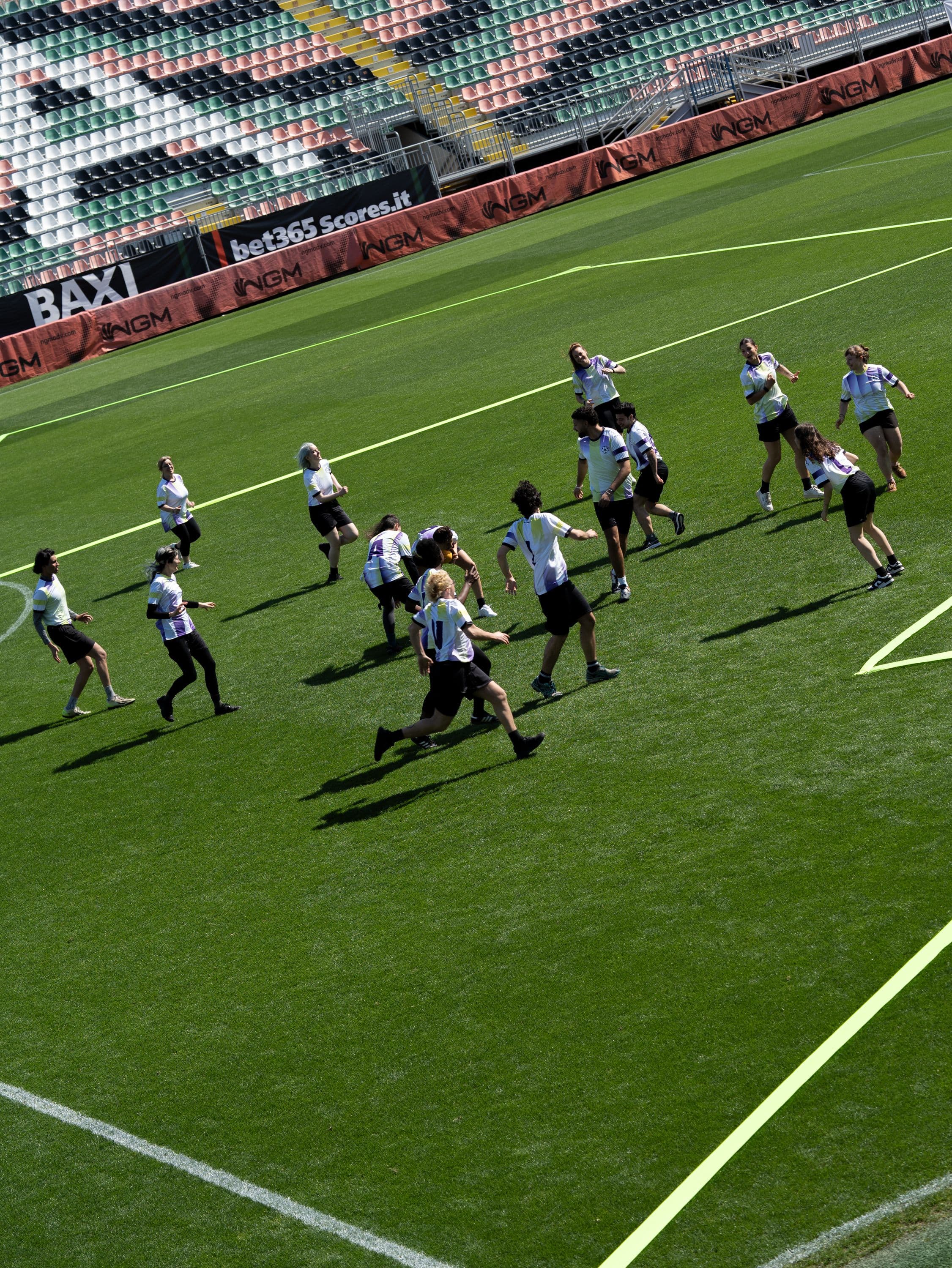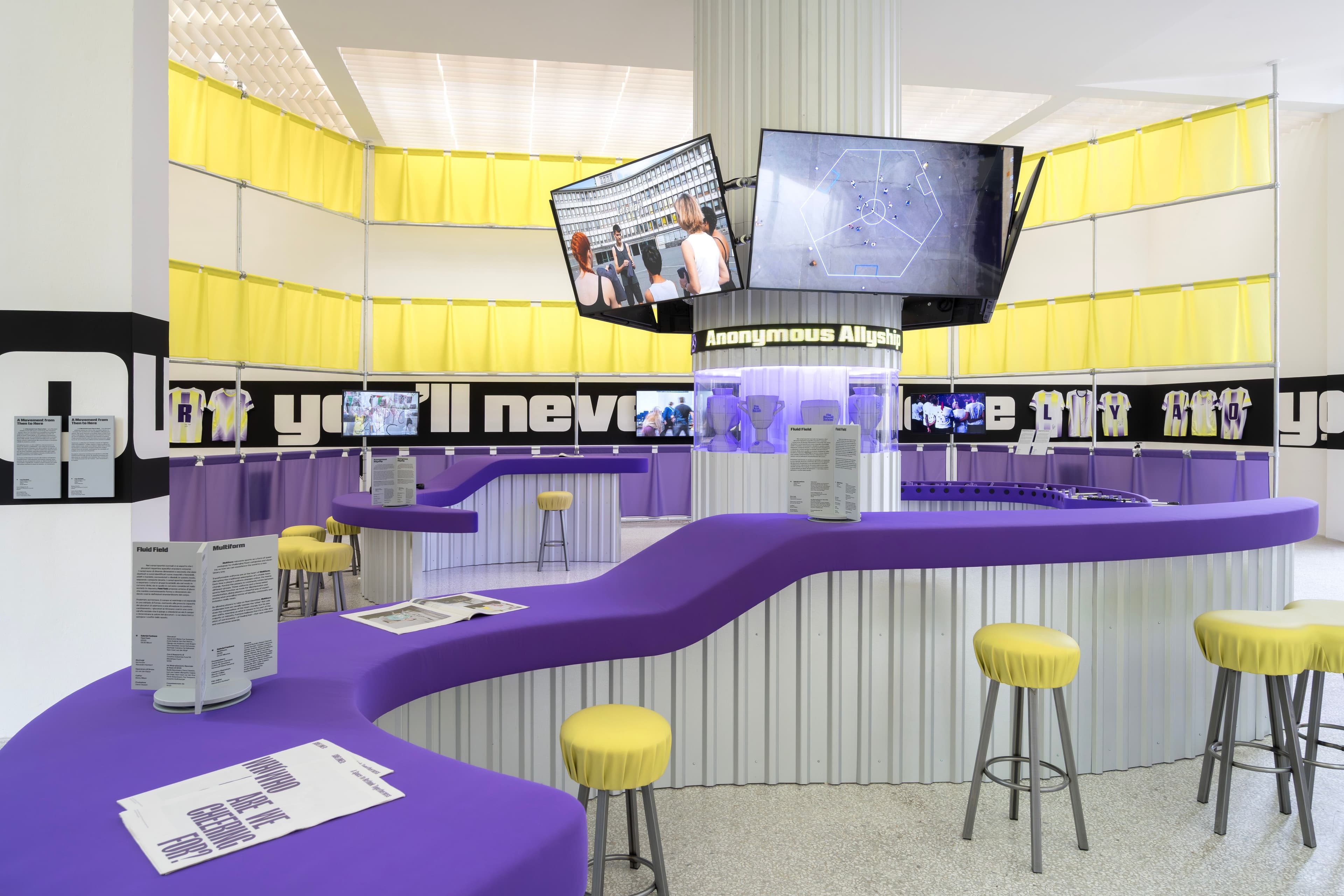Places That Prioritise People: Café Costa del Sol and Queer Gym Rotterdam
For SIDELINED: A Space to Rethink Togetherness, the Dutch contribution to La Biennale Architettura 2025, we developed a special sports newspaper to be spread across the pavilion. Designed by Doğa Gönüllü, this newspaper features conversations, interviews and essays — a selection of which we'll be gradually publishing throughout this year's Biennale. In the second article in this series, researcher Feargal Agard speaks with the owners of Queer Gym and Café Costa del Sol in, two spaces in Rotterdam that bring diverse communities together through sports.
25 June 2025
Words by Feargal Agard
Sports have always connected people, but community spaces like Queer Gym and Café Costa del Sol bring sports to a different level. Though located in different neighbourhoods in Rotterdam, they both cater to diverse communities. In the café, watching their beloved Feyenoord football team brings people together, while in the gym, the community is formed through sports participation.
The founder of Queer Gym, Romy Rockx, 33, studied theatre in Arnhem. He has lived in Rotterdam for seven years, and also co-founded a theatre collective there. After losing his job during the pandemic and while transitioning, Romy turned to sports, but the lack of safety and inclusion he experienced inspired him to start the Netherlands’ first queer gym about five years ago.
In the Feyenoord area of Rotterdam, Angela van Dorp, 53, and Miranda de Lang, 48, run a vibrant café named Costa del Sol. Angela has worked in hospitality since she was 15 and co-founded Costa del Sol after losing her first business during the pandemic. Miranda, who also lost her job at the time, switched careers and started working in hospitality.
A sense of belonging
When asked whom Queer Gym represents, Romy answers that it’s “a space for a multitude of bodies that are experienced as different by the outside world. For example, think of someone who has top surgery scars, and this person feels inclined to hide them. In this space, these bodies come into their power. Queer Gym aspires to be a safe space for queer and transgender people to feel confident in bodies that may not match societal norms. A gym without the stares, judgment, uninvited flirting and harassment that they could experience in regular gyms.” What also becomes clear is that Queer Gym prefers to place the focus on agency rather than competition. That is why the team at Queer Gym avoids scoreboards and unreachable goals, instead focusing on what customers want to achieve.
“ It is clear that Queer Gym prefers to place the focus on agency rather than competition. ”
“When we hold intake interviews with new potential members, we don’t ask them how queer they are; we work on trust—I mean, why else would you come here if this isn’t the place that you’re looking for?” Sometimes, it’s not a match, whether that’s because the potential member has fitness goals that are too intense, is seeking a space to cruise or corrects other people when they should be focusing on themselves. Queer Gym doesn’t have a traditional gym culture: no flashy equipment or overly macho energy. Cisgender and heterosexual people are welcome, though Queer Gym mostly attracts queer and trans individuals who seek a more inclusive space.
A place where everyone is welcome
At Costa del Sol, the space represents the neighbourhood around it. Firstly, the community consists of “mainly Feyenoord fans, but of all ages and different cultural backgrounds, which creates a unique atmosphere,” says Angela proudly. For children accompanied by parents, there is a special corner with snacks and lemonade so their parents can enjoy watching the game. Everyone is welcome, as long as they behave. The owners also consider the neighbourhood’s financial struggles, keeping prices affordable and sometimes allowing customers to come back and pay for their drinks on another day.
To the question of who doesn’t feel welcome in their café, Angela answers jokingly, “I don’t know who wouldn’t feel welcome here, maybe people from 020 [meaning Amsterdam] or supporters of Ajax [football team],” she and Miranda chuckle. Afterwards, they explain that they’re considerate of people who might not feel comfortable. For example, one time, an older couple who visited the café mentioned feeling out of place because of all the changes in their old neighbourhood. But it was heartwarming for Miranda and Angela to see them interact with the local youth, who, noticing this, showed consideration—moving elsewhere to smoke, offering them a seat or even bringing them a treat.
Spaces and their social dynamics
The social dynamics at Costa del Sol can be described as tough and direct but with love at their centre. For the owners, it’s important that everyone who enters through the door is treated equally. All they want is to maintain a welcoming atmosphere. Costa del Sol’s rules aren’t written, but they are clear. “We appreciate basic respect and common norms and values, but if you misbehave toward us or our customers, you’re out,” says Angela fiercely. In a way, you could say that rules based on common sense and honesty rule their space. Some customers test boundaries but eventually adapt to Costa’s intuitive code of conduct.
At Queer Gym, the staff believes that seeing queer individuals succeed, even as personal trainers, can inspire and normalise diversity and equality. Presently, they’re training 10 queer youths from diverse backgrounds to become personal trainers. They want to make sure that people can see themselves in the variety of trainers available.
In contrast to Costa del Sol, Queer Gym does have more outspoken rules. Team members Rosa and Djuna created a code of conduct, which they developed in collaboration with the rest of their community. It clarifies behaviour, expectations and even class cancellations. “It’s important to be mindful of each other and not to take up too much space through dominant behaviour, like scattering your belongings in the gym or harassing other people. Awareness fosters a safer environment.”
A safe place for all
The role of Queer Gym isn’t necessarily just about being queer: it’s about giving people a space to try new things and work on their identity, strength and mental health. Besides that, it’s also a great way for people to connect with the queer community on the level of sports, instead of going out to clubs or events.
Queer Gym is also focused on creating a functional, low-stimulus place that is inclusive for neurodiverse people. That is why the gym has removable mirrors, which is intended for those who do not want to be confronted with their reflection. Similarly, flyers, posters and other imagery do not show ideals of perfection, such as muscled bodies. Romy’s team member Djuna may look after the designs, the interior and their online presence, but much is decided as a team. Most of the material is DIY, featuring drawings, small paintings and no harsh colours. And although the gym space itself has a simplicity to it, it radiates warmth and softness.
“Queer Gym is there to support whoever wants to feel good in their bodies, but we also understand that sometimes people can reach their maximum and need to stop. That is fine because we cheer for you based on what you can do, so we’re already happy that they came,” says Romy. Queer Gym motivates people to come by allowing them to just exist—without judgment—while being part of a supportive group of like-minded people. Romy mentions that, “Everyone has a different journey. No matter if you are queer, transgender, big or small, we’re here to make you feel welcome, supported and celebrated.”
A second home to the community
“Costa del Sol is like a second home. Because of that, we often hear what’s happening in the neighbourhood and people know that we’re there for them in the good and bad times. We don’t want to be a place where people only come to drink and drunkenly crawl back home,” says Angela. The café’s unique interior was inspired by Angela’s son, who visited a Scottish pub after a Feyenoord match. Since opening, they’ve covered walls and ceilings with Feyenoord scarves, banners, signed jerseys and photos, creating a museum-like atmosphere. Fans come from across the country and abroad to take photos and to contribute new items. Famous visitors include football players like Tyrell Malacia and rappers such as Hef and Qucee.
“ "We often hear what’s happening in the neighbourhood and people know that we’re there for them in the good and bad times" - Angela van Dorp, Café Costa del Sol ”
Costa del Sol is more than just a Feyenoord café. “The whole café has been invited to weddings and we even closed the café for a few hours for Angela’s son’s rap performance,” Miranda mentions. They organise parties for every holiday, crowdfunded for someone’s medical treatment abroad, held a benefit for Palestine and even help explain tax papers. “People seem to genuinely love us and this place,” states Angela, smiling. As the conversation continues, it becomes clear that many of their regular customers lovingly refer to Angela and Miranda as mothers of the neighbourhood and jokingly refer to the café as the “clinic” and to themselves as its "patients".
An idyllic vision
Café Costa del Sol and Queer Gym have a lot more in common than one would expect. Besides a focus on sports, they both provide an escape from daily worries and the pressures of society. Though they must cover rent and survive, both prioritise people over profits—a rare approach today. Through a sense of belonging and addressing the needs of groups often overlooked by society, they strengthen their communities. In essence, they stand for an almost idyllic vision of how businesses can and should operate in society.
Words: Feargal Agard
Editor: Maia Kenney
This article was published in 'Who are we cheering for?' the dedicated sports newspaper for SIDELINED: A Space to Rethink Togetherness, the official Dutch contribution to the 19th International Architecture Exhibition – La Biennale di Venezia 2025.

